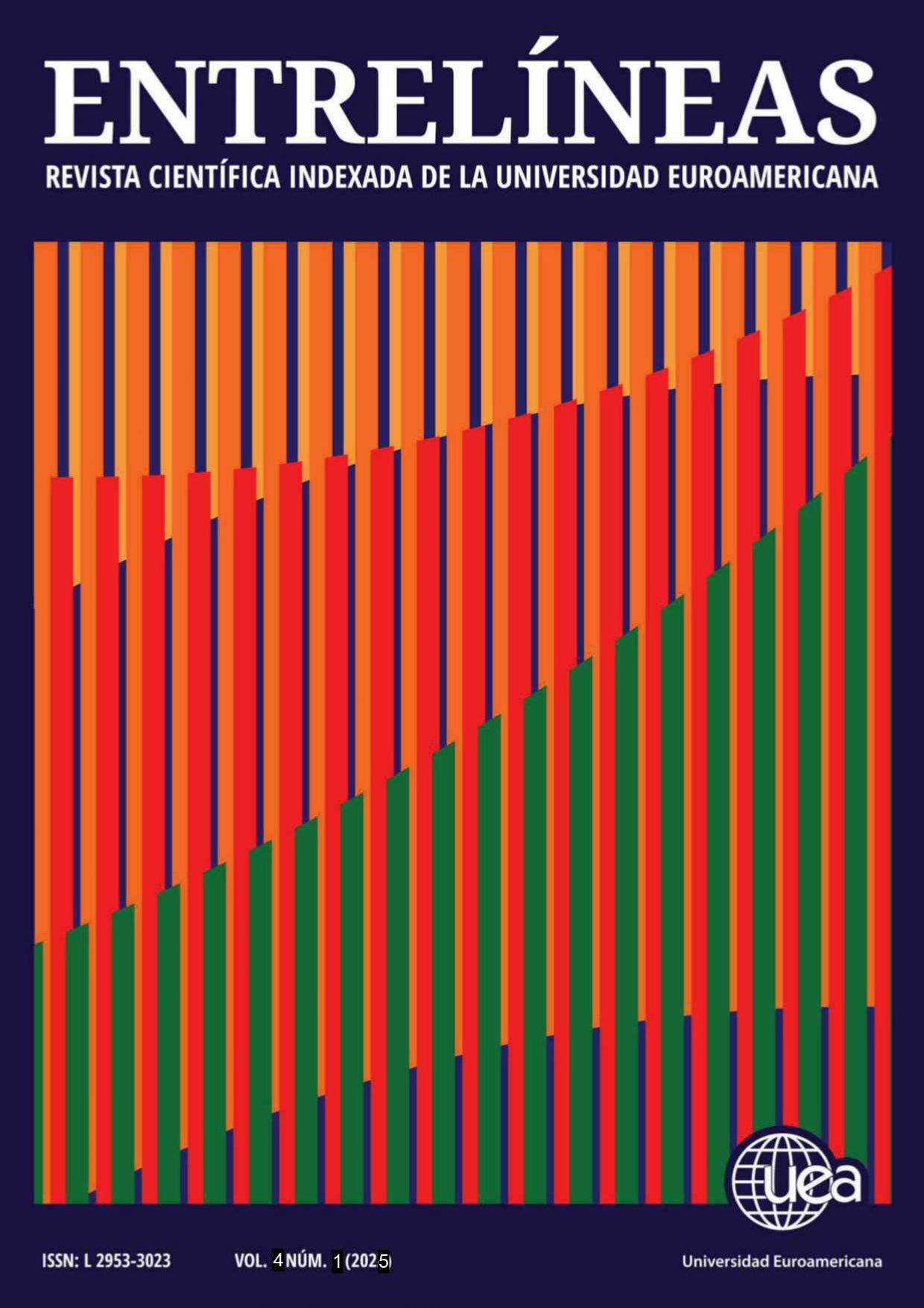Uso de la inteligencia artificial en las cuentas por cobrar
DOI:
https://doi.org/10.56368/Entrelineas416Palabras clave:
administración financiera, contabilidad, inteligencia artificialResumen
La inteligencia artificial (IA) ha transformado el sector contable al permitir la automatización de los procesos, mejorar la eficiencia y proporcionar análisis predictivos. En el actual entorno empresarial, su adopción es fundamental para mantener la competitividad y sostenibilidad, ya que se ahorra tiempo, reduce costos y aumenta la productividad. Este estudio se centra en describir la implementación de tecnologías de inteligencia artificial en la gestión de cuentas por cobrar, destacando su impacto en la eficiencia operativa y la toma de decisiones financieras. La investigación se basó en un enfoque metodológico inductivo, recopilando datos a través de fuentes documentales y seleccionando artículos relacionados con cuentas por cobrar e inteligencia artificial. A pesar de los desafíos que presenta su adopción, como la necesidad de recursos computacionales avanzados y las preocupaciones sobre la seguridad de los datos, su integración ofrece beneficios tangibles, por lo que se considera necesario que los profesionales contables adopten una actitud positiva y continúen mejorando sus habilidades para adaptarse a un entorno empresarial cada vez más automatizado y tecnológico, porque las herramientas basadas en inteligencia artificial no reemplazarán por completo a los contadores, sino que los ayudarán a evolucionar hacia roles más estratégicos y de gestión.
Descargas
Referencias
Anh, N. T. M., Hoa, L. T. K., Thao, L. P., Nhi, D. A., Long, N. T., Truc, N. T. & Ngoc Xuan, V. (2024). The Effect of Technology Readiness on Adopting Artificial Intelligence in Accounting and Auditing in Vietnam. Journal of Risk and Financial Management, 17(1), 27. https://doi.org/10.3390/jrfm17010027
ap Ramanei, T., Abdullah, N. L. & Khim, P. T. (2021). Predicting accounts receivable with machine learning: a case in Malaysia. In 2021 International Conference on Information Technology (ICIT) (156-161). IEEE. https://doi.org/10.1109/ICIT52682.2021.9491773
Appel, A.P., Louzada Malfatti, G., de Freitas Cunha, R. L., Lima, B. & de Paula, R. (2020). Predicting account receivables with machine learning. KDD MLF, 1-9. https://doi.org/10.48550/arXiv.2008.07363.
Bastar, S. G. (2019). Metodología de la investigación. Red Tercer Milenio.
Burgos Chávez, K. M. (2023). Plan estratégico para la recuperación de las cuentas por cobrar del segundo semestre del año 2022 de la empresa industrial Danec SA, en la ciudad Babahoyo [Tesis de Licenciatura]. Babahoyo: UTB-FAFI.
Chi, D. J. & Shen, Z. D. (2022). Using hybrid artificial intelligence and machine learning technologies for sustainability in going-concern prediction. Sustainability, 14(3), 1810. https://doi.org/10.3390/su14031810
Dankhe, G.L. (1986). Investigación y comunicación. McGraw Hill.
Dongre, N., Pandey, A. & Gupta, O.P. (2020). Artificial Intelligence in accounting: opportunities & challenges. J. Xi’an Univ. Archit. Technol, 12, 1858-1864. https://n9.cl/ty3ul
Gómez S., F. R. (2024). Metamorfismo de empresas familiares a corporaciones. Impresoluciones.
Hampton, B. (2020). SSON report. Automating Accounts Receivable Optimising Cash & Collections in Uncertain Times. SSON.
Ikechukwu, O., Nwakaego, D. A. & Celestine, A. (2015). The Effect of cash flow statement on companies profitability (A study of some selected banks in Nigeria). African Journal of Basic & Applied Sciences, 7(6), 350-356. 10.5829/idosi.ajbas.2015.7.6.1156
Jaslove, C. (2017). The rise of artificial intelligence: an analysis on the future of accountancy. Psychology. 18, 1-20. https://n9.cl/htovsf
Kanaparthi, V. K. (2023). Examining the Plausible Applications of Artificial Intelligence & Machine Learning in Accounts Payable Improvement. FinTech, 2(3), 461-474. https://doi.org/10.3390/fintech2030026
Kureljusic, M. & Metz, J. (2023). The applicability of machine learning algorithms in accounts receivables management. Journal of Applied Accounting Research, 24(4), 769-786. https://doi.org/10.1108/JAAR-05-2022-0116
Lapiedra, R., Forés, B., Puig-Denia, A. & Martínez-Cháfer, L. (2021). Introducción a la gestión de sistemas de información en las empresas. Publicacions de la Universitat Jaume I.
Lee, C.S. & Tajudeen, F.P. (2020). Usage and impact of artificial intelligence on accounting: Evidence from Malaysian organisations. Asian Journal of Business and Accounting, 13(1), 213-239. https://doi.org/10.22452/ajba.vol13no1.8
Li, Z. & Zheng, L. (2018). The impact of artificial intelligence on accounting. In 2018 4th International Conference on Social Science and Higher Education (ICSSHE 2018). Advances in Social Science, Education and Humanities Research (ASSEHR), 181, 813-816. https://doi.org/10.2991/icsshe-18.2018.203
Miranda Chicango, K. M. (2020). Proceso contable e información financiera de la distribuidora farmacéutica “Esfarma” SCC, de la ciudad de Santo Domingo, periodo 2019. [Tesis de Ingeniería]. UniAndes.
Odoh, L. C., Echefu, S. C., Ugwuanyi, U. B. & Chukwuani, N. V. (2018). Effect of artificial intelligence on the performance of accounting operations among accounting firms in South East Nigeria. Asian Journal of Economics, Business and Accounting, 7(2), 1-11. 10.9734/AJEBA/2018/4164
Tian, J., & Li, L. (2022). Research on artificial intelligence of accounting information processing based on image processing. Mathematical Biosciences and Engineering, 19(8), 8411-8425. 10.3934/mbe.2022391
Yang, X. (2023). Research on the Application of Big Data Intelligence Technology in the Optimization of Accounts Receivable Management of E-commerce Enterprises Under the Financial Sharing Mode. International Journal of Computational Intelligence Systems, 16(1), 121-131. https://doi.org/10.1007/s44196-023-00293-8
Zheng, M. (2022). Advanced Artificial Intelligence Model for Financial Accounting Transformation Based on Machine Learning and Enterprise Unstructured Text Data. Hindawi Mobile Information Systems, 2022, 1-11. https://doi.org/10.1155/2022 /5708652
Descargas
Publicado
Número
Sección
Licencia

Esta obra está bajo una licencia internacional Creative Commons Atribución-NoComercial 4.0.
Usted es libre de:
- Compartir — copiar y redistribuir el material en cualquier medio o formato
- Adaptar — remezclar, transformar y construir a partir del material
- La licenciante no puede revocar estas libertades en tanto usted siga los términos de la licencia
Bajo los siguientes términos:
- Atribución — Usted debe dar crédito de manera adecuada , brindar un enlace a la licencia, e indicar si se han realizado cambios . Puede hacerlo en cualquier forma razonable, pero no de forma tal que sugiera que usted o su uso tienen el apoyo de la licenciante.
- NoComercial — Usted no puede hacer uso del material con propósitos comerciales .
- No hay restricciones adicionales — No puede aplicar términos legales ni medidas tecnológicas que restrinjan legalmente a otras a hacer cualquier uso permitido por la licencia.










